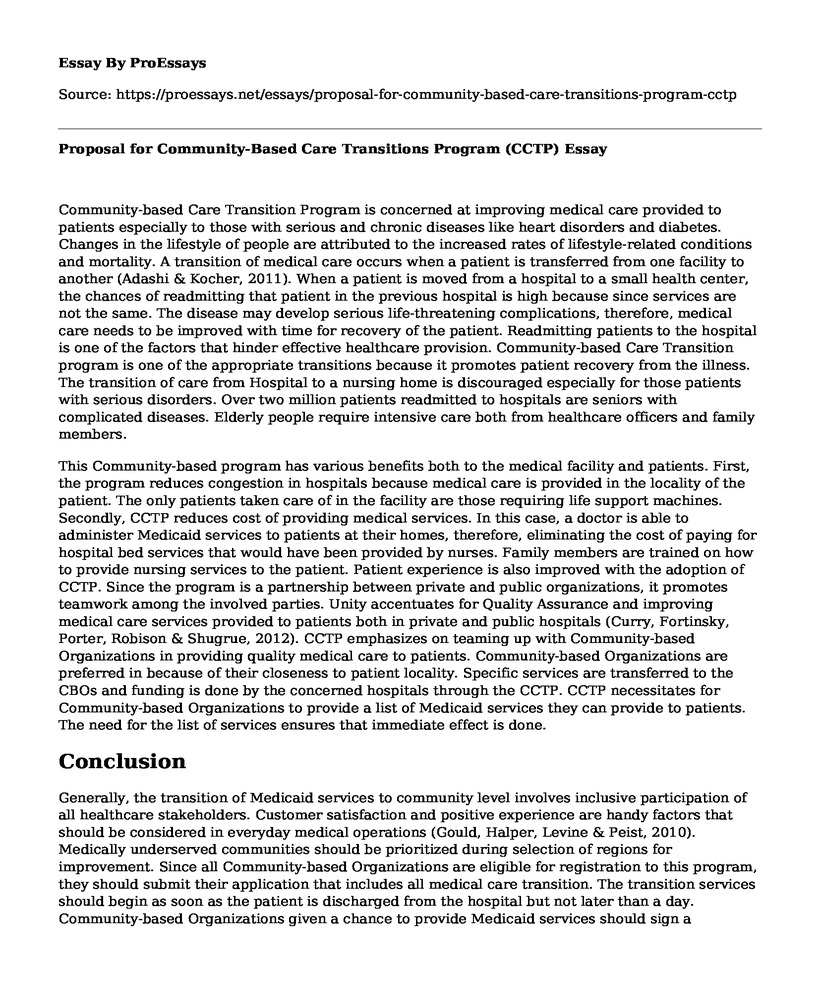Community-based Care Transition Program is concerned at improving medical care provided to patients especially to those with serious and chronic diseases like heart disorders and diabetes. Changes in the lifestyle of people are attributed to the increased rates of lifestyle-related conditions and mortality. A transition of medical care occurs when a patient is transferred from one facility to another (Adashi & Kocher, 2011). When a patient is moved from a hospital to a small health center, the chances of readmitting that patient in the previous hospital is high because since services are not the same. The disease may develop serious life-threatening complications, therefore, medical care needs to be improved with time for recovery of the patient. Readmitting patients to the hospital is one of the factors that hinder effective healthcare provision. Community-based Care Transition program is one of the appropriate transitions because it promotes patient recovery from the illness. The transition of care from Hospital to a nursing home is discouraged especially for those patients with serious disorders. Over two million patients readmitted to hospitals are seniors with complicated diseases. Elderly people require intensive care both from healthcare officers and family members.
This Community-based program has various benefits both to the medical facility and patients. First, the program reduces congestion in hospitals because medical care is provided in the locality of the patient. The only patients taken care of in the facility are those requiring life support machines. Secondly, CCTP reduces cost of providing medical services. In this case, a doctor is able to administer Medicaid services to patients at their homes, therefore, eliminating the cost of paying for hospital bed services that would have been provided by nurses. Family members are trained on how to provide nursing services to the patient. Patient experience is also improved with the adoption of CCTP. Since the program is a partnership between private and public organizations, it promotes teamwork among the involved parties. Unity accentuates for Quality Assurance and improving medical care services provided to patients both in private and public hospitals (Curry, Fortinsky, Porter, Robison & Shugrue, 2012). CCTP emphasizes on teaming up with Community-based Organizations in providing quality medical care to patients. Community-based Organizations are preferred in because of their closeness to patient locality. Specific services are transferred to the CBOs and funding is done by the concerned hospitals through the CCTP. CCTP necessitates for Community-based Organizations to provide a list of Medicaid services they can provide to patients. The need for the list of services ensures that immediate effect is done.
Conclusion
Generally, the transition of Medicaid services to community level involves inclusive participation of all healthcare stakeholders. Customer satisfaction and positive experience are handy factors that should be considered in everyday medical operations (Gould, Halper, Levine & Peist, 2010). Medically underserved communities should be prioritized during selection of regions for improvement. Since all Community-based Organizations are eligible for registration to this program, they should submit their application that includes all medical care transition. The transition services should begin as soon as the patient is discharged from the hospital but not later than a day. Community-based Organizations given a chance to provide Medicaid services should sign a document that contains rules and regulations governing the program.
Regards
Sign:
Name:
References
Adashi, E. Y., & Kocher, R. P. (2011). Hospital Readmissions and the Affordable Care Act: Paying for coordinated quality care. Jama, 306(16), 1794-1795.
Curry, L. A., Fortinsky, R. H., Porter, M., Robison, J., &. Shugrue, N. (2012). Transition from Home Care to Nursing home: Unmet Needs in a Home-and Community-based Program for Older Adults. Journal of Aging & Social Policy, 24(3), 251-270.
Gould, D. A., Halper, D., Levine, C., & Peist, A. (2010). Bridging Troubled Waters: Family Caregivers, Transitions, and Long-term Care. Health Affairs, 29(1), 116-124.
Cite this page
Proposal for Community-Based Care Transitions Program (CCTP). (2022, Nov 28). Retrieved from https://proessays.net/essays/proposal-for-community-based-care-transitions-program-cctp
If you are the original author of this essay and no longer wish to have it published on the ProEssays website, please click below to request its removal:
- What justice issues does Alexander raise?
- Public Health: From Ancient Greece to Today - Essay Sample
- Essay Sample on Rethinking Foster Care: Examining Challenges at the Micro-Level
- UCLA STOMP: A University of Choice During COVID-19 Pandemic - Essay Sample
- Paper Sample on Becoming a Psychiatric Nurse Practitioner at Walden College of Nursing
- Free Essay Example on Improve Your Nursing Practice with Evidence-Based Practices
- Essay Sample on Levels of Policy







